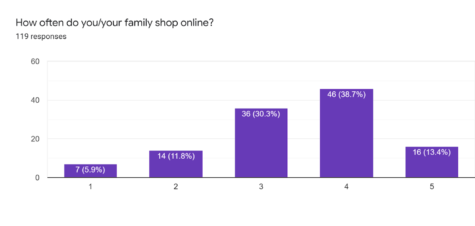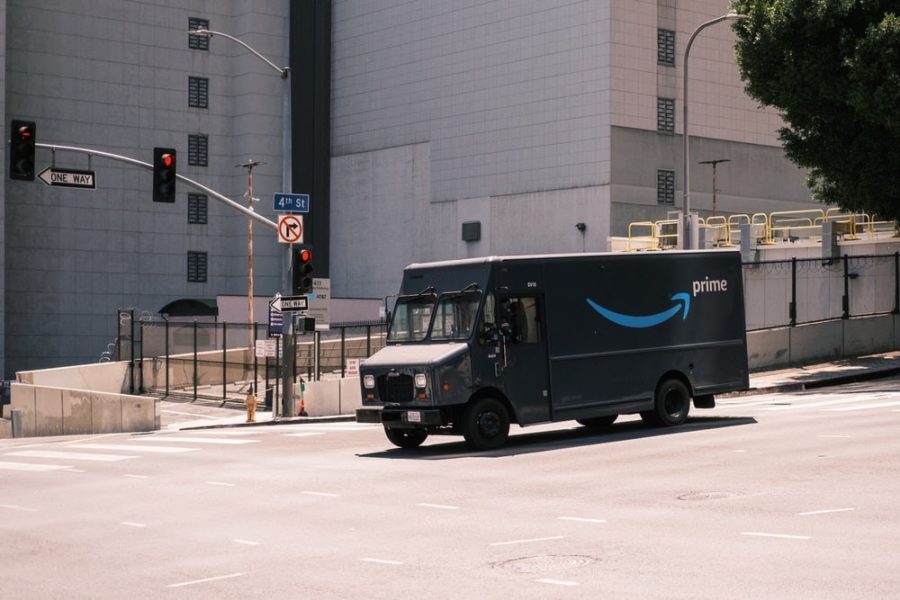Why You Should Not Shop From Amazon This Holiday Season
Shopping online from large corporations such as Amazon.com can be bad for the environment and for local small businesses.
An Amazon driver in Los Angeles works to complete his deliveries.
Thanks to e-commerce giants like Amazon, it’s never been easier to purchase a product — with a few taps of a button and 48 hours, virtually any item can be right at your doorstep!
In 2020, Amazon delivered a total of 4 billion packages in the United States, adding up to a total revenue of over $386 billion, a 37.6% increase from 2019. It’s clear that Amazon has firmly established itself in today’s global market. I surveyed 120 Bronx Science students about their online shopping habits and found that online shopping is used somewhat frequently by them. In addition, most students said that they and their families usually shop online using Amazon.com. I also asked students how much the shipping arrival time mattered to them on a scale from 1 (not at all) to 5 (a lot). Most answers fell between 3 and 4.
“The recent shipping delays due to the Coronavirus pandemic are a wake up call for how much we rely on online shopping now,” said Raquel Andon ’24. “Without online shopping, we are a bit lost.” More people are now focused on making quick, easy purchases in order to fulfill their shopping needs. But the truth is that our obsession with Amazon online shopping contributes to destruction of the environment, a loss of profits for small businesses, and continues to fuel Amazon’s exploitive power. With the December 2021 holiday season approaching, it’s time to make some changes to our online shopping habits.

To be clear, online shopping is not always bad for the environment; an MIT study found that it can actually be more eco-friendly for suburbanites who live far away from brick-and-mortar stores. Shipping routes deliver packages at a more optimized rate, creating a smaller carbon footprint than if one were to drive far away to a physical location. Most of the carbon emissions that come from traditional, in-person shopping is from ‘customer transportation.’
To minimize your carbon footprint, try to group your shopping stops. For instance, if you plan on buying something from a faraway store, try purchasing from other stores in the area while you are there; by doing so, it will also save more time. This concept of bundling can also be applied to online shopping; that way, products can arrive in the same box, on the same van, reducing the overall carbon footprint of your purchases.
People who order online with fast shipping tend to have a greater carbon footprint. The same MIT study discussed the carbon emissions for shoppers and compared the ‘cybernaut’ (a person who uses the internet) and ‘traditional shoppers’ in brick and mortar stores. The MIT study noted, “The Cybernaut tends to have a lower environmental impact than the traditional shopper, as long as he does not use speed delivery.” Amazon has capitalized off of society’s fast-paced demands. Now, Prime subscribers can easily choose 2-day or same day shipping without any added price. As Anne Goodchild, a professor of civil and environmental engineering at the University of Washington, said, “When we’re not paying some sort of personal cost for the trip, I think it’s easy to overlook how much travel we’re adding.”
“Online shopping is becoming more and more widespread. Sites like Amazon, while known for treating their employees poorly, are thriving because of their convenience for a typical online shopper,” said Maheen Alam ’25. Amazon partners with other delivery companies in order to deliver their packages, who are pressured to meet deadlines, pushing supervisors to coerce drivers into delivering packages faster. Third-party supervisors often pressure drivers to skip meals, neglect their own health, and drive recklessly so that they can deliver an average of 200-300 packages per day. In a Business Insider interview, one driver described an incident where he smashed his fingers in the van door; his fingers began to bleed severely, yet his supervisor’s main concern was with the undelivered packages, not the driver’s personal harm.
Amazon also tracks their drivers. If they see a driver behind on packages, they may call the driver’s supervisor to see if they need help. Though there are helpful supervisors who genuinely seek to assist their drivers, oftentimes, supervisors will instead threaten the driver in order to quicken their delivery pace. Most drivers cannot risk losing their jobs, and Amazon can easily fire them. One former driver said, “If I didn’t come in on my day off, they threatened to fire me.” Given this massive power over thousands of workers’ livelihoods, what Amazon says, often goes.
The increased reliance on corporations like Amazon also means that many small businesses are losing sales. Goods from small businesses may be more expensive because of the human labor involved in producing them, but shopping locally puts money in the hands of the local merchants, rather than gigantic corporations. This money is much more likely to be circulated back into the economy. Also, more small businesses are starting to pop up online. The rise of platforms like Instagram marketing and Depop have made it easier to shop small. Social media can be especially useful because many small businesses post regularly about new products, sales, and behind-the-scenes footage. It’s very heartwarming to see how much care and effort these small businesses put into making their products. It helps to humanize the people making your products in a way that giant corporations cannot replicate. Small businesses are great places to go for gift-shopping because oftentimes items are handmade (with love!) and tend to be very unique.
These tips can also apply to other household necessities like toothbrushes or school supplies, not just gifts. Start implementing small changes in your shopping habits, such as shopping from eBay or Depop instead of Amazon, or bundling your orders together. If possible, try waiting a little to purchase products in-person; try supporting small businesses instead of chain stores. But sometimes, online shopping is cheaper. Many people shop online or from Amazon because of their financial situation, and that’s okay. These tips can and will look different for everyone. Be aware of the shopping choices that you make and why you make them. Be informed and shop informed.
“The recent shipping delays due to the Coronavirus pandemic are a wake up call for how much we rely on online shopping now,” said Raquel Andon ’24. “Without online shopping, we are a bit lost.”
Jacey Mok is an Editor-in-Chief for 'The Science Survey.' She loves the art of masterfully crafting a story and bringing the reader into the scene. She...

